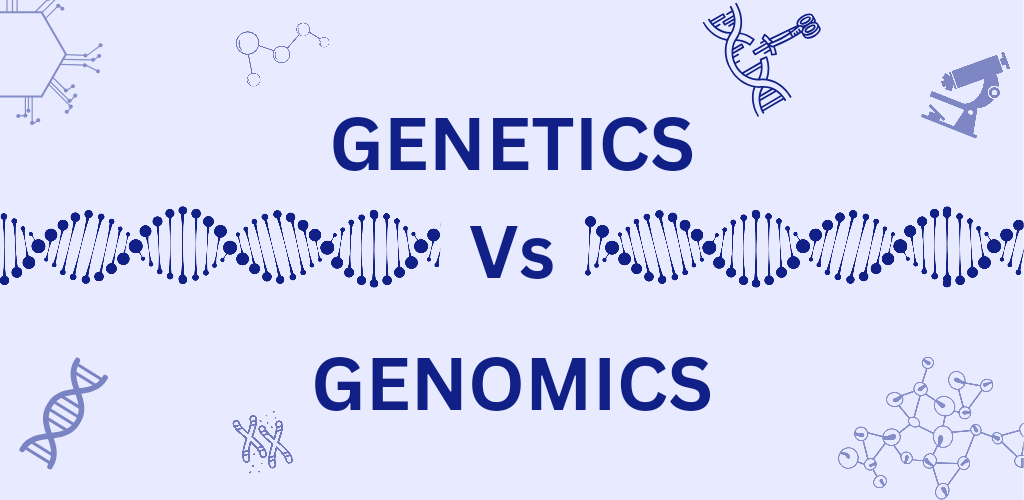The human body would be the story of someone’s imagination, from the colour of eyes to the tone of voice; so many mysterious things happen in our body. If we look at it from the perspective of science, this mystery will seem to be just a magical story, because you have got the answers to all the mysteries of your body, and the body that is still being discovered is also solving many puzzles with the help of genetics and genomics. Today through this blog we will be understanding genetics and genomics in depth.
So if you want to understand the difference between genetics and genomics in one line, then the below environment is enough.
Genetics studies the characteristics of an individual or species, while genomics studies the genome of the entire organism, which includes all the genes and their functions.
Before understanding genetics and genomics, we need to understand a little about genes.
What are Genes
Genes are pieces of DNA that are identified by a specific function in a living organism. This DNA is a type of molecule which is found in every living cell and records its genetic heritage.
Here are some key points you should know about Genes:
DNA Structure: Genes are located in the fragments of DNA. The basic form of DNA is deoxyribonucleic acid, which is made up of a variety of colourful nucleotide fragments.
Genetic Code: Every gene codes for a specific function. This code is a mixture of 4 nucleotide bases (adenine, thymine, cytosine, and guanine).
Chromosome: Genes are not found in small pieces, rather they are found in long pieces which are found in the form of chromosomes. In individuals chromosomes are found in 23 pairs.
Genetic Inheritance: Genes are inherited from our parents. They play a vital role in our personality, health, and development.
Mutations: Sometimes, a change or mutation occurs in the genes, which changes the genetic makeup of a person. Some mutations are helpful for life, while some are harmful.
Gene Expression: Genes contribute to the development and functioning of a person. Gene expression means how a gene performs its function.
Genetic Engineering: Nowadays, scientists are succeeding in modifying genes. This is called genetic engineering, through which we can make changes in living evolution.
If you have understood about genes then it will be much easier for you to understand the difference between genetics and genomics.
What is Genetics
Genetics is a branch that studies the variations and genetic classification that occur in living organisms.
Scope: Genetics is the field which studies the genes present in an individual, living being or the genes of a living organism from the worldly form.
Study: In genetics, it is used in medicine, pregnancy, and genetic classification. It specifically studies the qualities of individuals, which are passed on by a mother to her children.
Medical Treatment and Diagnosis: Genetics can be used to identify predispositions to diseases, such as genetic factors contributing to developmental disorders.
Through the study of heredity and diseases, medical professionals can determine treatment approaches tailored to individual genetic makeup.
What is Genomics
Genomics is a field of study that studies the genome (genetic material) of the entire organism, which includes all the genes and their structure.
Scope: Genomics is a study that studies the genome of a perfect living organism, which includes the study of genes, their functions, and their structure.
Study: Genomics often involves a comprehensive study of the entire genome of an organism. It dives into the structural and functional aspects of all genes. In a commercial context, genomics is frequently used to identify and understand the impact of genetic variations.
Functional Genomics: A crucial aspect within genomics is functional genomics, which involves studying the functions of genes, i.e., a structural and functional study of gene behavior.
Personalized Medicine: Genomics enables the development of personalized medical treatments based on an individual’s genetic makeup, known as “personalized medicine.”
Genetic Variation: Genomics helps identify genetic variations, revealing differences in genetic makeup among different individuals.
Biotechnology and Research: Genomics is extensively used in biotechnology to develop genetically modified organisms (GMOs) and enhance various biological processes.
In research, genomics contributes to advancements in treatment and innovative approaches to genetic understanding.
Dr.Omics keeps science exclusive information coming to you. We hope this blog will help you in understanding genes and genomics.
Dr.Omics’ DNA testing is based on gene information to detect diseases. Check out the DNA-testing kit and understand the importance of genes. How study of genes can help you in survival.




